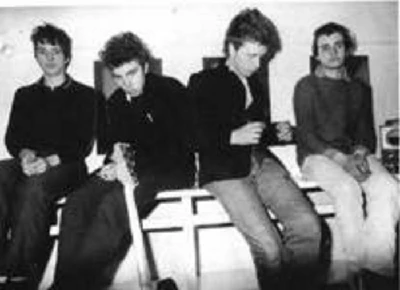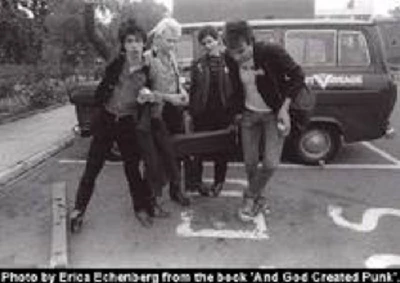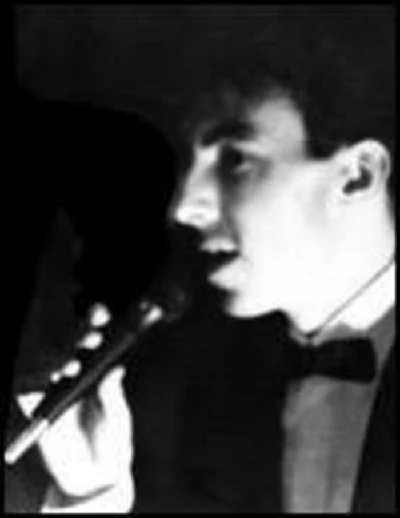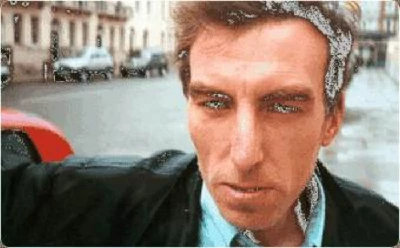published: 17 /
2 /
2003
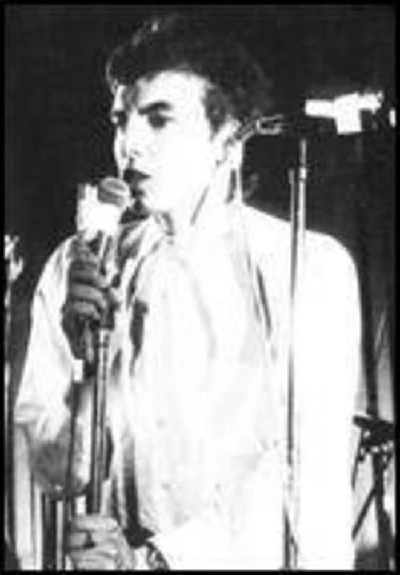
One of the early punk groups, the Subway Sect played with the Sex Pistols and toured with the Clash, but fell victims to bad management and misfortune. Frontman Vic Godard talks to John Clarkson about the band's history, and his long solo career
Article
Vic Godard first met with musical notoriety as a teenager when his band, the Subway Sect, played it debut show at the legendary 100 Club Punk Festival in London in September 1976.
Godard and his friends, Rob Simmonds, Paul Myers and Paul Smith, had begun to hang out together at early Sex Pistols shows a few months before. The band formed a few days prior to the festival, with Godard on vocals, Simmonds on guitar, Myers on bass and Smith on drums, when the Sex Pistols’ manager Malcolm McLaren suggested that they might like to put together a band to expand the line-up which already included the Pistols, the Clash, the Buzzcocks, Siouxsie and the Banshees and the Vibrators.
Afterwards the band, which performed four songs that night, would go on to play a series of similar explosive short sets around London, before supporting the Clash, with whom Godard would share the same manager, Bernie Rhodes, for six years, on their ‘White Riot’ tour of 1977.
While the Subway Sect initiallly sounded like a rawer version of the Modern Lovers, it began, as its members became more accomplished on their instruments, to display an increasingly accomplished and ambitious sound that proved to be as influenced by French pop, Northern Soul and the Velvet Underground as it was by punk. The band’s debut single,’Nobody’s Scared’, which was one of the songs which the group had first played at the 100 Club gig, came out in April 1978. It followed this with a second single, ‘Ambition’ in December of that year, which sold 20,000 copies and topped the independent charts for nine weeks.
Even before ‘Ambition’ came out, , the mercurial-tempered Rhodes had, however, decided to sack all the band, except for Godard, for reasons which have never been made clear. The group had recorded an album’s worth of material , but these songs have never seen release.
With new line-ups of the Subway Sect, Godard went on to release his eventual debut album , the skiffle -influenced ‘What’s the Matter, Boy ?’ two years later in 1980 , and then a swing influenced second LP ‘Songs for Sale’ in 1982.
Always experimental, he began work on a solo album, ‘T.R.O.U.B.L.E’, with an assortment of London jazz musicians later on that year. The label,Blanco y Negro, which had agreed to release it , however, ran into financial difficulties, and the incomplete ‘T.R.O.U.B.L.E’ was shelved until 1986, when it finally came out a small local label, Upside.
Disillusioned and disappointed, Godard retired from the music business , and became a postman. He did not reappear onto the music scene until 1993, when he returned with a solo album, ‘The End of the Surrey People’’, which, produced by Edwyn Collins, was released on the specially revitalized Postcard label. His next album, another solo record, the gospel-influenced ‘Long Term Side Effect’, came out in 1998. This was followed later on that year ‘In T.R.O.U.B.L.E’ Again’ a reworked and complete version of ‘T.R.O.U.B.L.E’, and then in 1999 by a compilation abum, ‘Twenty Years of Vic Godard and the Subway Sect’ .
Godard continues to balance working as a postman with a musical career His latest album, ‘Sansend’, the first to use the Subway Sect moniker in twenty years, came out in October, and, recorded entirely on computer, has both hip hop and bangri influences
With a major tour and another album, ‘Blackpool’, both planned for later this year, Pennyblackmusic caught up with Vic Godard to talk to him about his past and present, and his long musical career.
PB : Is it true that the Subway Sect were formed after Malcolm McLaren suggested that you and your friends put together a band to play at the 100 Club punk festival, or is that just the stuff of punk myth ?
VG : No, that is true. Definitely !
PB : Had you any prior experience of playing shows or gigs or being in a band ?
VG : None at all. No ! We bought a drum kit between us on HP for £85. Malcolm then paid for us to do a full week’s rehearsal. He block booked this studio, and arranged for the bloke who owned it to come in a bit earlier, because they didn’t used to open until about midday. Malcolm arranged for him to let us in at nine ‘o’ clock, so we could have it right the way through until about six ‘o’ clock at night.
PB : And you rehearsed every day for a week ?
VG : We did that for a week. Yeah ! At the end of that week Malcolm came down to hear us. We had agreed at the beginning of the week that he would make a decision then whether he thought we were good enough to play or not.
PB : Did you write a lot of the songs that week, or did you work on them before ?
VG : That’s something that I can’t really remember. I think it was sort of half and half. We had written down the words, but not actually tried to do anything with them.
I remember that on the first day we sounded so abysmal that I didn’t think that we would be able to do it by the end of the week. By the end of that week, we just had four songs, and they were just about good enough for us to go ahead with the gig.
PB : That particular festival has developed a legendary status. Were you aware at the time how significant that event was going to be ?
VG : Oh, yeah, definitely ! We realised it on the day. Until then punk had been like a real underground thing that noone knew anything about. On that day though the queue for the 100 Club went on and on round the block. There was a kid there that we went to school with. We had always thought of him as a normal straightahead type, but ,seeing him in the queue, that was when we knew that it had gone national.
PB : Were you scared then when you had to get up on stage ?
VG : Yeah, we were absolutely terrified. A lot of the fear had gone though before we got on stage ,because the really terrifying bit for us came before that at the sound check.
Getting on the stage in front of the audience was not nearly as frightening, because we had already been through the worst bit by then which was doing all the songs with all the other groups watching (Laughs).
PB : Can you remember much else about that night ?
VG : I remember the Clash’s set. I remember the Sex Pistols’ set. I don’t remember that much about what we did. I remember more about it from being a punter and looking at the Sex Pistols and the Clash and the Buzzcocks really.
PB : The early Subway Sect wore grey cardigans and jumpers, while bands like the Clash were wearing Jackson Pollock spattered shirts, and the Sex Pistols wore clothes from the ‘Sex’ shop in King’s Road. Was that a deliberate attempt at image or was that just the way you were ?
VG : We definitely went for the Oxfam look. We were the only group that we knew about in London that looked like that, but when we got out of London, we saw that there were groups like the Buzzcocks in other towns that were virtually the same as us.
PB : As a group you listened as well to Debussy, and were influenced by the French cinema and books like ‘A Clockwork Orange’. Did you feel part of the punk scene or did you feel largely segregated from it ?
VG : We definitely felt part of it initially. It was too small for us not be. What was going on in the outside world was completely different to anything that any of us lot were doing. Even though we were very different to the other punks what the punks as a whole were doing was still miles away from anyone else .
PB : What about latterly ? Did you continue to feel part of the punk movement when it became more global ?
VG : No, we felt part of it when it was an undergound movement , but when it really took off we started trying to get away from it.
PB : One of the things that you said at the time was that you wanted to “polarise” people. Was that an aim then to be hated as much as you were loved ?
VG : Yes ! It always has been.
PB : And even now that has carried on ?
VG : Yeah, definitely !
PB : You went on the ‘White Riot’ tour with the Clash. How did you enjoy that experience ?
VG : Oh, I loved it ! It was really fantastic. It was just like being in a great big long film that went on for six weeks. It was really good. It was like being back in school in many ways.
PB : What do you mean by that ?
VG : We had just left school and, being back on the tour , was just like being back there because we had someone taking care of us and telling us what to do every minute of the day. There was a good atmosphere with all the bands on the coach as well , and there was a real school boy element to things. We got up to lots of high jinks, let off the fire extinguishers in the hotels and that sort of thing.
PB : The initial group unfortunately only recorded two singles, ‘Nobody’s Scared’ and ‘Ambition’ together. You also recorded a lost album, some tracks of which appeared on the ‘Twenty Years On...’ compilation. What happened to that album ? Why was it never released ?
VG : I think it was never released becaused noone would pay for the tapes. From what I have actually gathered since then, by doing a bit of detective work, the studio where it was recorded got flooded, so there is an actual possibility as well that the master was actually destroyed, and that noone took anything out of there other than the stuff that you see surface on the occasional bootleg with a few tracks on.
We didn’t have a record contract, so there wasn’t any record label pushing for an album. It didn’t really suit Bernie Rhodes to push for us either because he was busy with the Clash, and then he went to America with them. I think we got a bit left by the wayside . The momentum we had when recording the album just got lost.
PB : Why did the original line-up split up ?
VG : Well, Bernie sacked everybody, but me. That’s what happened. We didn’t ever meet and say “ Oh right, we’ll split up”. Bernie offered me a wage as a songwriter as long as I didn’t stay with the band.
PB : The first album, “What’s the Matter, Boy ?’, which was recorded by a different line-up, finally came out in 1980. Who appeared on that ?
VG : That was Terry Chimes (Early Clash drummer-Ed), and his brother Paul and me mainly. Dan Keller from the 101ers put in an appearance as well, and the Black Arabs, who appeared in the Sex Pistols film ‘The Great Rock ‘n’ Roll Swindle’ were brought in originally to sing backing vocals, but they ended up playing loads of the instruments as well. There’s a lot of percussion and things like that from them on there.
PB : How do you feel about that album now ?
VG : I have never really liked it. There’s a few good tracks, like ‘Birth and Death’ , but I didn’t like it even it much at the time because I wasn’t happy with the production. I wasn’t allowed any input at all into what the sound came out like. I played the guitar myself, but the person who owned the studio possibly redid it all because he said it wasn’t in tune. That was the story that Bernie told me at the time anyway.
PB : After all that work then, and having finally got to the stage of releasing an album, did you feel disappointed then ?
VG : Not really. No. I just wanted to get the songs out. A lot of those songs were the same songs that I had been doing since the punk era . While I had totally changed the way they sounded by making them into skiffle numbers, the idea of the album was simply to get the songs done and out, which is what we did.
PB : After that you experimented with Northern Soul for a while, and then went on to play swing with yet another line-up of the Subway Sect. You toured at the time of “Songs for Sale’ with people like the Birthday Party and Bauhuas, and have described it since as “the most satisfying rebellion that I have ever been a part of”. What did you mean by that ?
VG : It was the middle of the Goth era. We had started doing naive pop music and dressing up in tweed jackets and things like that. We really did look like people from outer space.
PB : How did you go down ?
VG : We didn’t go down too badly some of the time, but I remember that we did one gig at Liverpool which was the most violent response that I have ever had.There was a hail of bottles through out the whole set. There were some gigs where the audience really loved it though.
PB : There is one story about a group of skinheads, who were the support band, and Sthe ubway Sect throwing bottles at each other as well.
VG : Yeah, that was the Angelic Upstarts. That was in Edinburgh. It all ended up fairly happily though. We kissed and made up with each other at the end.
PB : Oh, right. Having bottled each other first...
VG : (Laughs) Yeah !
PB : You released ‘Songs for Sale’ and then T.R.O.U.B.L.E.’ before dropping out of music. Why did you decide to retire ?
VG : Well, Bernie was getting really fed up with me, and I was getting really fed up with him.That was one reason.
We had big problems with the ‘T.R.O.U.B.L.E.’ album as well. It was due to come out on a new label, Blanco y Negro, which Geoff Travis from Rough Trade had set up. He’s really helped me out a lot over the years, but being on that label was a complete disaster for me really. They got a load of money off Warner Brothers and signed a lot of bands. The album cost too much though, and it ended up getting shelved. It never got finished because the budget ran out halfway through the mixing. It was a really bad experience. I was really fed up about that also, and that was the other reason why I decided to retire.
PB : You’ve got a different version of that album out now . How do you feel about that album now that you have re-released it ?
VG : I love it. I really like it. ‘I think that ‘In T.R.O.U.B.L.E Again’. is one of the best things that I have done.
PB : What about ‘Songs for Sale ?’
VG : Yeah, I like that as well.
PB : The backing band for ‘Songs for Sale’ became the Jo Boxers and went on to Top 10 success. Were you at all surprised by that ?
VG : Yeah, really surprised. Yeah ! I didn’t think that would be a hit at all, that ‘Boxer Beat’. (‘Boxer Beat’ went to No 3 in December 1982-Ed)
PB : You came back though in the early 90’s with ‘The End of the Surrey People’ Why did you decide to return to music, and how did you get back into music ?
VG : It’s mainly because of the amount of musical people at the Post Office I suppose. There was one bloke in particular, Paul Baker. We call him “The Wizard”. He started talking to me about his 4 track and he got me round to his house doing songs with him. It all developed from there really. I have never stopped doing 4 track recording ever since. It’s actually a lot better than 8 track recording.
PB :Did you find it easy getting back into songwriting after seven or eight years away?
VG : Yeah ! I didn’t find it difficult. ‘Johnny Thunders’, was the first thing that I wrote. I wrote it just after he died on the day that I saw his obituary in the newspaper.
PB : The album was produced by Edwyn Collins, and was released on the resurrected Postcard label. How did they become involved in the project ?
VG : That was as the last resort. The whole thing was Edwyn’s project. He felt responsible for getting it out. He had been chosen as its producer by Geoff Travis, who was going to put it on Rough Trade.
Geoff ran into financiail difficulties though at that point, and he did a really big downsizing and so he didn’t have the budget to put it out,. We went to Jeff Barrett at Heavenly and he really liked it, but just before he put it out, it got taken over by Sony, so that got shelved. Edwyn didn’t really want to do it, but he said “Look, as a last option, let’s put it on Postcard. It either comes out on Postcard or it doen’t come out at all.” And so I did.
PB : Was the album recorded quickly or slowly ?
VG :It was recorded quickly on the days we were recording, but we recorded it only one day here and one day there, so it took a long time.
We did a lot of it in Edwyn’s bedroom. He had a kid, William, growing up who wasn’t that old, so he was sort of running around most the time. Edwyn didn’t live in a very big house at that point as well. It was only a little flat, and he kept all his recording equipment in his bedroom. It was a bit difficult for him having to finish the album off like that in those circumstances, but that was the only way we could do it without a budget
PB : It is a really exuberant album. It’s got a real joyous feel to it a lot of it. Did you feel happy to be back to be recording again ?
VG : Yeah, I did.
PB : The album after that was ‘Long Term Side Effect’ which has an almost gospel feel to it. Would you agree ?
VG : Yeah ,I think that is because the players. A lot of that is down to Pete Saunders, who was on the piano. He’s got a really gospelly way of playing. We also had Martin Pine, who is a percussion player. I think that whatever those two do they bring their own unique sound to it.
There’s a really unusual story attached to that album. On the first day that we rehearsed together I was a bit late. By the time I got there the band had started up rehearsing by playing all these TV themes. I really liked them. The first few of the songs started off as TV themes, The theme from Barry Norman’s film programme is on there, while ‘Zero Tolerance’ was originally the “Crossroads’ theme (laughs). That’s how the songwriting bit of it started off. I turned up and said “You’ve got to keep doing these songs” and then started thinking about melodies and things to put over the top of them.
PB : You’ve recently released a new album ‘Sansend’, which was recorded at Sansend Studios in Fulham. It took nearly two years to complete. Why did it take so long to put together ?
VG : It was because we only worked on it on Sunday afternoons. The album was recorded over two years of Sunday afternoons. The bloke that I did it with, Nick Brown, is a carpenter by trade, and he is also involved in running the studio in Sansend as well
While we were recording in one room there were bands rehearsing in the other room as well. A lot of time they were heavy metal bands. With a lot of my vocals I had to wait until they had finished whatever song they were rehearsing, and tnen to try and fiit in before they started the next song. There was no sound proofing between the control room and the other rooms.
PB : It was recorded largely on a Mac, wasn't it ?You have said elsewhere that you're a bit of a technophobe.How necessary did you find it learning the necessary computer skills ?
VG : I haven't learnt any computer skills.
PB : Did you just tell Nick what you wanted to do ?
VG : Yeah, I sat there and told him what I wanted and then he put it in to the computer
PB : You've always been really experimental but twenty years ago you perhaps didn’t have the technology to experiment as you would have wanted. Now that you can, do you find its satisfying ?
VG : I do .Yeah ! It's not as good as four track recording though.It's much better having a jam on a four track with yourself.
PB : Would you not do another album on computer then ?
VG : I am not saying that I wouldn’t. I am just saying that I can’t do it by myself. I can only do that sort of thing when someone else is there putting stuff in on the computer. It just takes too long really. I like doing things a bit quicker than that.
PB : It features a guest appearance on the last track 'Heavy Heavy Heavy Load' by the reggae star, Larry Marshall, who recorded his contribution in Jamaica. How did he become involved in the project ?
VG : He's on the same label as me. Jim Dutton, my manager, (who also runs Motion Records, Godard’s current label-ed) put an album out by him a few years ago. 'Heavy Heavy Load' was one of the tracks. It didn’t have much of a melody on it, but it had a fantastic backing track, so I worked out a tune and then sent it off to Larry Marshall. He liked it and sang his vocals over it and then sent it back again.
PB : The album also features guest appearances fromChantelle Lamond, and Paul Reekie. Who are they ?
VG : Rob Simmonds, who was our first guitarist, and who sings backing vocals on ‘Lazy So and So’(One of the tracks on ‘Sansend-Ed), works in Fulham Library which is just around the corner from that studio. Chantelle was one of the library assistants there, and he just thought that she had a good voice and so he told her to come down and have a go at singing
When she came down I decided to write a song, ‘Turn Your Back on Everyone’, to get her to do a lead vocal. She did all the backing vocals on the other ones as well.,
She's now gone off with a garage type group. We did a gig not long ago, and tried to get her to do it with us, but she didn't return any of our phone calls. I think she realises that she has got a chance at the big time, and she doesn't want to waste her time with us (Laughs). She's got youth on her side.
PB : She's very young then, is she ?
VG : Yeah ! She's only about sixteen. I think that she was only fifteen when she recorded ‘Don’t Take It All Out on Me’. She's got quite an old sounding voice. I told her to sing it like Shirley Bassey. She had never heard of her. If you are fifteen, you wouldn't know though really, would you ? She went home and asked her Mum who she was (Laughs).
PB : Paul Reekie is a poet in Edinburgh, isn't he ?
VG : Yeah ! I met him when I was doing a gig up in Edinburgh. He was heckling me, and we have been writing to each other ever since really.
PB : You seem really popular up here. You play a lot of gigs in Scotland. Why do you think you have done so well up there ?
VG : I don't know. The question is why I have done so badly down here more (Laughs). It must be because they have a lot more taste up there I reckon (Laughs).
PB : How's 'Sansend' been selling ?
VG : Terrible ! We haven't done many gigs though yet to promote it, but we've got loads lined up though, starting on February 21st and going right through until May. The album came out in October, and the big problem was that none of the big shops would take it in the build up to Christmas. It was too late.Some of them said that they might do it in the New Year, so that's why we're furiously booking all these gigs. Hopefully they will now put in it the shops and someone will buy it.
PB : As a lot of the album was recorded on computer, how do you hope to take the new songs out on the road ?
VG : Oh, we've already done it. We've already played a couple of gigs. We're a lot better live. It's a really good recording on the computer, but if you get the songs sorted out and then get a proper band, it's a great feeling. It really brings eveything to life.
We're doing a lot of new stuff now as well apart from the album. I did a musical, “Blackpool’ with Irvine Welsh, the Scottish write, r about a year or two. It was shown and performed at Queen Margaret College in Edinburgh, but nearly all my songs got chopped out of it,
We're, therefore, going to be doing an album of the 'Blackpool' songs,. That's what the other aim of these gigs is. We're going to keep playing the 'Blackpool' songs until we've got them really sounding good, and then we're going to go back and do an album of it. They used only three of the songs at Queen Margaret’s Collge, so we're going to record all ten of them.
It's going to have a very old fashioned sound. There’s going to be no guitar on it, and where there might be a guitar, there's going to be a ukelele band instead. Luckily our violinist plays a ukelele banjo as well. H ehas said that he will teach me", so I am learning from him
PB : When do you hope to get that album out ?
VG : We're starting rehearsals next Tuesday, and will start it once we have finished touring in May. Hopefully we’ll get it out by the end of the year..
PB : Thank you for your time
Picture Gallery:-
